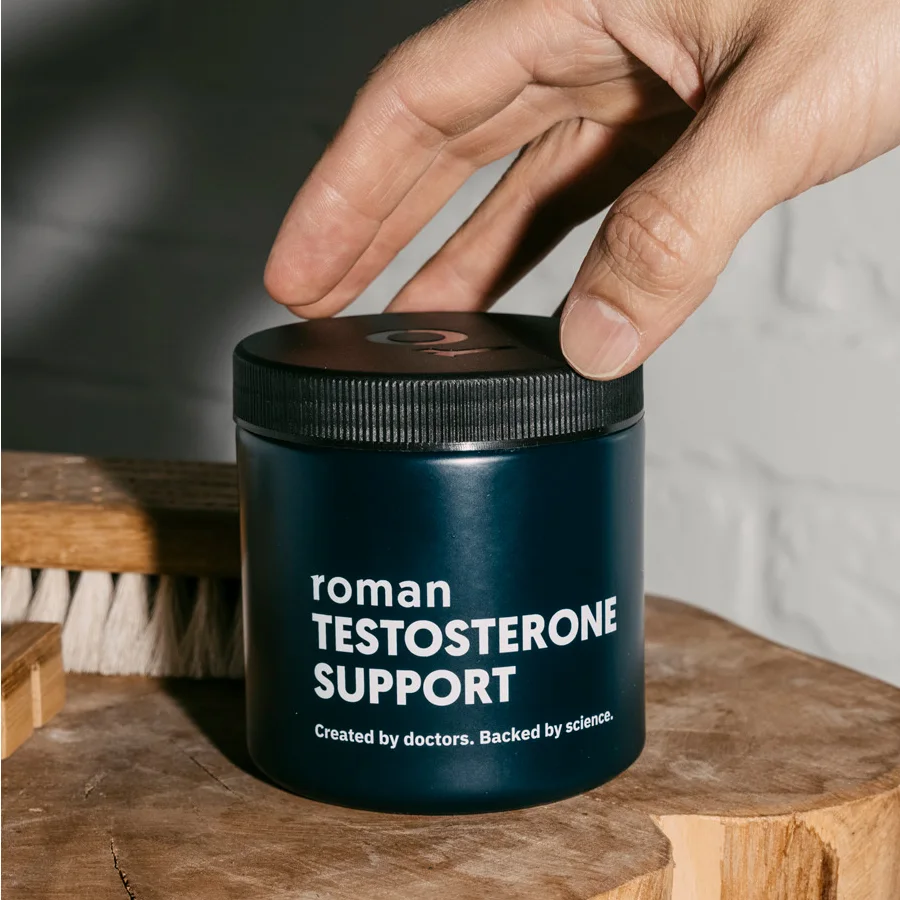Here's what we'll cover
Here's what we'll cover
Here's what we'll cover
You may think of testosterone as the primary sex hormone in biological men (even though all people need testosterone to function). But what about DHEA? DHEA (dehydroepiandrosterone) is a steroid hormone that biological men naturally produce through their 20s and is essential to sexual development.
Because DHEA naturally begins to drop with age, some people may benefit from a DHEA supplement. DHEA supplements can improve sexual function, support healthy muscle mass, reduce obesity, and more. Continue reading to learn more about the benefits and side effects of DHEA for men.
What is DHEA?
DHEA (dehydroepiandrosterone) is a steroid hormone that men’s bodies produce in the adrenal glands, brain, and testes. From there, it circulates into the bloodstream as dehydroepiandrosterone sulfate (DHEA-S or DHEA-sulfate), where the body converts it into testosterone and other “male” sex hormones called androgens.
DHEA contributes to many “male” sexual characteristics that define puberty—oily skin, body odor, and pubic hair growth (Webb, 2006).
Although DHEA is the most prevalent steroid hormone in the human body and is sometimes referred to as the “fountain of youth hormone,” your supply doesn’t last forever (Webb, 2006). Levels of DHEA peak between ages 20 and 30, then the number starts to decline. By the time a man is 70–80 years old, his DHEA hormone levels are 10–20% of what they were when he was younger (Neunzig, 2014). When DHEA levels start to decline, some older men turn to DHEA supplements as replacement therapy.
DHEA benefits for men
There are many claims out there about the potential health benefits of DHEA for men. Over the years, DHEA supplements have been touted for their ability to enhance sexual function, improve energy, treat adrenal insufficiency, and manage body fat and body composition.
However, research on the benefits of DHEA for men has produced mixed results, and large, randomized trials are needed to confirm DHEA’s potential benefits for well-being (Rutkowski, 2014). Before starting DHEA, discuss the potential benefits with your healthcare provider.
DHEA for ED
DHEA turns into sex hormones, so it seems only natural that men would turn to the supplement to improve their sex lives. Several small studies have suggested that DHEA can improve erectile dysfunction (ED), a condition that makes it difficult to get or maintain an erection sufficient for satisfying sex.
One study found that men with ED who took DHEA daily for six months had an improved ability to achieve or maintain an erection. However, the supplement did not raise their testosterone levels (Reiter, 1999). Other studies have not shown that DHEA improves symptoms of ED, so more research is needed.
DHEA for building muscle
According to the NIH’s report on Dietary Supplements for Exercise and Athletic Performance, DHEA has not demonstrated any proven benefit for physical performance in terms of increasing muscle strength, aerobic capacity, lean body mass, or testosterone levels in men (NIH, 2022).
DHEA for obesity
Some small studies suggest that DHEA may help reduce abdominal fat and insulin resistance, factors linked to type 2 diabetes (Villareal, 2004). However, other studies do not show that DHEA is effective for weight loss and treating obesity (Jedrzejuk, 2003).
More research is needed to identify an association between DHEA and obesity or weight loss.
DHEA for immune function
Little evidence exists to explain DHEA's potential impact on the immune system and immune function. For the few immune diseases for which DHEA has been tested, like Sjogren syndrome, the results have not been promising (Hartkamp, 2008). More research is needed to know whether DHEA can help with other immune conditions like ulcerative colitis, systemic lupus erythematosus, or Crohn’s disease (MedlinePlus, 2022).
Side effects of DHEA
Additional research is needed to determine the safety of DHEA supplementation. According to the NIH, DHEA is probably safe to take at regular doses (50 mg per day) for less than two years. It is potentially unsafe if taken at higher doses or for more extended periods of time. Most side effects of DHEA supplements are mild and can include acne and an upset stomach. (MedlinePlus, 2022)
DHEA interactions and risk factors
DHEA supplements may be harmful to people with health conditions such as depression, bipolar disorder, diabetes, heart disease, liver disease, and prostate cancer. They also carry a list of potential interactions with various medications (MedlinePlus, 2022).
Seek medical advice regarding any possible drug interactions with medicines you may be taking, including antidepressants, diabetes medications, blood thinners, testosterone supplements, and others (MedlinePlus, 2022).
DHEA dosage
Although the DHEA dosage varies by the specific need and formula, the typical daily dose is approximately 50–100 mg by mouth. DHEA supplements are potentially unsafe if you use them for longer than two years or take more than 100 mg per day (MedlinePlus, 2022; Li, 2020).
DHEA may provide some benefits for men, but the research is mixed and we need more studies to really understand its benefits and risks. At the end of the day, if you’re considering supplementing with DHEA, it’s best to have a conversation with your healthcare provider so that they can help you make an informed (and safe) decision.
DISCLAIMER
If you have any medical questions or concerns, please talk to your healthcare provider. The articles on Health Guide are underpinned by peer-reviewed research and information drawn from medical societies and governmental agencies. However, they are not a substitute for professional medical advice, diagnosis, or treatment.
References
Hartkamp, A., Geenen, R., Godaert, G. L., et al. (2008). Effect of dehydroepiandrosterone administration on fatigue, well-being, and functioning in women with primary Sjögren syndrome: a randomised controlled trial. Annals of the Rheumatic Diseases , 67 (1), 91–97. doi:10.1136/ard.2007.071563. Retrieved from https://pubmed.ncbi.nlm.nih.gov/17545193/ .
Jedrzejuk, D., Medras, M., Milewicz, A., & Demissie, M. (2003). Dehydroepiandrosterone replacement in healthy men with age-related decline of DHEA-S: effects on fat distribution, insulin sensitivity and lipid metabolism. The Aging Male: The Official Journal of the International Society for the Study of the Aging Male , 6 (3), 151–156. Retrieved from https://pubmed.ncbi.nlm.nih.gov/14628495/ .
Li, Y., Ren, J., Li, N., et al. (2020). A dose-response and meta-analysis of dehydroepiandrosterone (DHEA) supplementation on testosterone levels: perinatal prediction of randomized clinical trials. Experimental Gerontology , 141 , 111110. doi:10.1016/j.exger.2020.111110. Retrieved from https://www.sciencedirect.com/science/article/abs/pii/S0531556520304587
MedlinePlus. (2022). DHEA . Retrieved on Nov. 22, 2022 from https://medlineplus.gov/druginfo/natural/331.html
National Institutes of Health (NIH). (2022). Dietary supplements for exercise and athletic performance. Retrieved on Nov. 22, 2022 from https://ods.od.nih.gov/factsheets/ExerciseAndAthleticPerformance-HealthProfessional/
Neunzig, J. & Bernhardt, R. (2014). Dehydroepiandrosterone sulfate (DHEAS) stimulates the first step in the biosynthesis of steroid hormones. PLoS One 9 (2), e89727. doi:10.1371/journal.pone.0089727. Retrieved from https://pubmed.ncbi.nlm.nih.gov/24586990/
Reiter, W. J., Pycha, A., Schatzl, G., et al. (1999). Dehydroepiandrosterone in the treatment of erectile dysfunction: a prospective, double-blind, randomized, placebo-controlled study. Urology , 53 (3), 590–595. doi:10.1016/S0090-4295(98)00571-8. Retrieved from https://pubmed.ncbi.nlm.nih.gov/10096389/
Rutkowski, K., Sowa, P., Rutkowska-Talipska, J. et al. (2014). Dehydroepiandrosterone (DHEA): hypes and hopes. Drugs, 74 , 1195–1207. doi:10.1007/s40265-014-0259-8. Retrieved from https://pubmed.ncbi.nlm.nih.gov/25022952/
U.S. Food and Drug Administration (FDA). (2016). FDA approves Intrarosa for postmenopausal women experiencing pain during sex . Retrieved on Feb. 3, 2022 from https://www.fda.gov/news-events/press-announcements/fda-approves-intrarosa-postmenopausal-women-experiencing-pain-during-sex
Villareal, D. T. & Holloszy, J. O. (2004). Effect of DHEA on abdominal fat and insulin action in elderly women and men: a randomized controlled trial. JAMA , 292 (18), 2243–2248. doi:10.1001/jama.292.18.2243. Retrieved from https://pubmed.ncbi.nlm.nih.gov/15536111/
Webb, S. J., Geoghegan, T. E., Prough, R. A., & Michael Miller, K. K. (2006). The biological actions of dehydroepiandrosterone involve multiple receptors. Drug Metabolism Reviews, 38 (1-2), 89-116. doi:10.1080/03602530600569877. Retrieved from https://www.ncbi.nlm.nih.gov/pmc/articles/PMC2423429/



